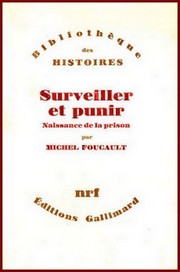Discipline and Punish

Cover of the French edition
|
|
| Author | Michel Foucault |
|---|---|
| Original title | Surveiller et punir |
| Translator | Alan Sheridan |
| Country | France |
| Language | French |
| Subject | Prisons Prison discipline Punishment |
| Published |
|
| Media type | Print (Hardback & Paperback) |
| Pages | 318 |
| ISBN | (First English edition) |
| OCLC | 3328401 |
| 365 | |
| LC Class | HV8666 .F6813 1977 |
Discipline and Punish: The Birth of the Prison (French: Surveiller et punir: Naissance de la prison) is a 1975 book by the French philosopher Michel Foucault. It is an analysis of the social and theoretical mechanisms behind the changes that occurred in Western penal systems during the modern age based on historical documents from France. Foucault argues that prison did not become the principal form of punishment just because of the humanitarian concerns of reformists. He traces the cultural shifts that led to the predominance of prison via the body and power. Prison used by the "disciplines" - new technological powers that can also be found, according to Foucault, in places such as schools, hospitals, and military barracks.
In a later work, Security, Territory, Population, Foucault admitted that he was somewhat overzealous in his argument that disciplinary power conditions society; he amended and developed his earlier ideas.
The main ideas of Discipline and Punish can be grouped according to its four parts: torture, punishment, discipline, and prison.
Foucault begins by contrasting two forms of penalty: the violent and chaotic public torture of Robert-François Damiens, who was convicted of attempted regicide in the mid-18th century, and the highly regimented daily schedule for inmates from an early 19th-century prison (Mettray). These examples provide a picture of just how profound the changes in western penal systems were after less than a century. Foucault wants the reader to consider what led to these changes and how Western attitudes shifted so radically.
He believes that the question of the nature of these changes is best asked by assuming that they weren't used to create a more humanitarian penal system, nor to more exactly punish or rehabilitate, but as part of a continuing trajectory of subjection. Foucault wants to tie scientific knowledge and technological development to the development of the prison to prove this point. He defines a "micro-physics" of power, which is constituted by a power that is strategic and tactical rather than acquired, preserved or possessed. He explains that power and knowledge imply one another, as opposed to the common belief that knowledge exists independently of power relations (knowledge is always contextualized in a framework which makes it intelligible, so the humanizing discourse of psychiatry is an expression of the tactics of oppression). That is, the ground of the game of power isn't won by 'liberation', because liberation already exists as a facet of subjection. "The man described for us, whom we are invited to free, is already in himself the effect of a subjection much more profound than himself." The problem for Foucault is in some sense a theoretical modelling which posits a soul, an identity (the use of soul being fortunate since 'identity' or 'name' would not properly express the method of subjection—e.g., if mere materiality were used as a way of tracking individuals then the method of punishment would not have switched from torture to psychiatry) which allows a whole materiality of prison to develop. In What is an Author? Foucault also deals with notion of identity, and its use as a method of control, regulation, and tracking.
...
Wikipedia
